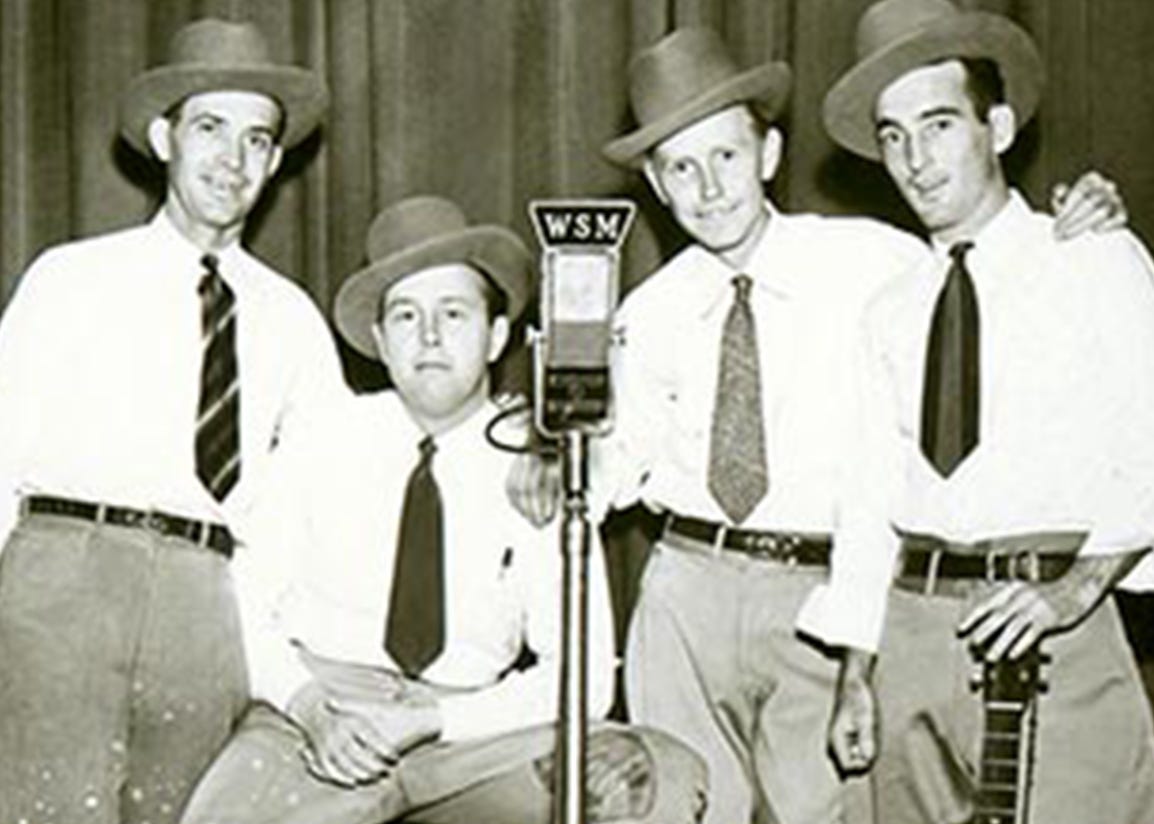Can A City Build An Innovation Economy Out Of Lifestyle Choices?
Nashville has all the pieces, including a lot of remote workers. Can it pull them all together to create a next generation of prosperity?
If you like The Future Of Where, please help us out. Free subscribers help us spread the word, while paying subscribers help us pay the bills. Please consider becoming a free or paid subscriber today.
The Covid pandemic shuffled the deck for American cities – creating a lot of winners and losers – and arguably one of the biggest winners was Nashville.
Like Austin and Miami, Nashville was pegged during COVID as a place that the folks who drive the economy were fleeing to – especially from California. Yes, like those other two cities, it’s in a red state. But the combination of a creative local scene (driven by the legendary country music scene), relatively low prices by California standards, and Middle Tennessee beauty was a big draw.
Today, 20% of employed Nashville residents work remotely – significantly higher than the national average. In other words, Nashville is increasingly a location of choise – a lifestyle choice – for footloose workers. The question is whether Nashville and its major institutions – especially Vanderbilt University – leverage these remote workers and its other economic assets into a next-gen innovation economy that will be a national leader.
Both the city and Vanderbilt are betting that they can. Together they’ve created the Nashville Innovation Alliance to kickstart innovative businesses in town, and Vanderbilt has also bought 40 acres near its campus, where it plans to build a mixed-use innovation district. (Vanderbilt has also brought in Creative Cities guru Richard Florida as a visiting professor, and he’s helping them out on the innovation stuff as well.)
At first glance, you’d think Nashville is kind of a mini-Austin – a music town that’s also a state capital and a college town, attracting people because it’s hip. But there’s a little more to Nashville than that.
Nashville’s Got More Than Austin
For one thing, Willie Nelson notwithstanding, Nashville is a more important music town than Austin. Indeed, Nashville’s emergence as the center of country music is a great of example of what we would today call an economic development success story. When the powerful WSM radio station turned away from classical music and began broadcasting the Grand Ol’ Opry in the late 1920s, musicians streamed to Nashville from Appalachia, drawn by what they heard on the radio. A cultural and economic asset that had been locked up in the mountains for hundreds of years was unlocked by radio, and Nashville continues to reap the benefits today. (The story is wonderfully told in Air Castle of the South: WSM and the Making of Music City.)
This year is the 100th anniversary of the Grand Ol’ Opry.
The music business is important not just as a backdrop but as a critical part of the city’s creative economy. Entrepreneurs and business innovators tend to be nerdy workaholics. But the fact of the matter is that they are creative – and creative people like to be around other creative people, no matter what they are creating.
(Nashville has also emerged as a big party town; for some weird reason that no one seems to understand, it’s now the capital of bachelorette parties. The best estimate is that Nashville hosts more than 100 bachelorette parties per day.)
But Nashville, unlike Austin, has a strong corporate sector as well. Hospital Corporation of America (HCA), founded by the Frist family in Nashville in 1968 (think former U.S. Sen. Bill Frist, who’s the son of the founder), forms the basis for the strongest corporate health care sector in the nation. Several HCA executives formed other health care corporations, which rode the privatization trend of hospitals to considerable profitability. Nashville’s health care economy is estimated at almost $31 billion and employing 170,000 people. A third of the nation’s for-profit hospitals are owned by Nashville-area companies. (Many of these companies are located not in Nashville proper but in the affluent suburb of Franklin, which I wrote about last week.)
The Spinoff Effects of the Health Care Sector
What’s important here is not just that Nashville’s health care economy is booming but that there are important spinoff effects for other economic sectors, especially the innovation sector. For one thing, it’s got the bankers and intellectual property lawyers a city needs to build an innovation economy. And because if its corporate success, it’s got a base of philanthropy that Austin – with the exception of the Michael & Susan Dell foundation – has simply never had.
The Schermerhorn Symphony Center is a testament to Nashville’s philanthropic power.
Then there’s Vanderbilt itself. The university was founded by with a gift from Cornelius Vanderbilt during the Reconstruction Era and gradually emerged as one of the “Southern Ivies”. (Others include Duke in North Carolina, Rice in Houston, and Emory in Atlanta.) Today Vanderbilt is regularly ranks among the top private universities in the country and its $10 billion endowment is in the top 20 nationwide.
And finally there are the remote workers. Indeed.com has ranked Nashville as one of the most attractive cities in the country for remote work, and as I noted above it’s got more than its share of remote workers. And as remote work grows, you can’t just think remote workers as individuals who happen to be hanging around coffee shops in your town. As I wrote a while ago, When they congregate in one place – as they are doing in Nashville – you have to think of them as an economic development asset.
Can They Pull It Off?
So, Nashville has a creative scene, a corporate and philanthropic base, a prominent and well-endowed university, and a growing reputation as an attractive place for remote workers. The question is, can they put all the pieces together successfully?
The Nashville Innovation Alliance is certainly an impressive start, although it’s just getting going. And Vanderbilt’s commitment to the innovation district shows that the university is serious.
Vanderbilt is a key economic asset.
But the nation is littered with cities that tried to build an innovation economy and succeeded for a while but ultimately failed. To succeed, Nashville needs to follow the most important lesson of economic development: commit to a sustained long-term effort, not to short-term shiny objects.
That means maintaining a tricky balance between short-term political support and the long-term support of the civic and academic sectors. The current mayor, Freddie O’Connell, is solidly behind the effort, as the city’s involvement in the Innovation Alliance shows. But he’s Nashville’s fourth mayor in the last decade, which is a reminder that overreliance on one political leader can be a mistake.
And the long-term support can’t come just from Vanderbilt. It’s also got to come from the rest of the civic and business community as well – especially the health care sector, since it’s so dominant. The civic and philanthropic arms of the health care industry have to embrace the entire innovation economy, not just those portions of it that benefit health care. In other words, they have to follow innovation wherever it leads. (This has been a problem in, for example, Hosuton, where energy leaders understand innovation in their own industry, but not in the medical industry, which they largely fund with philanthropic efforts.)
So maybe Nashville can pull it off. As I say, it’s got all the pieces. But if the Nashville effort does succeed, it won’t be because one or two players – the mayor, Vanderbilt – push the idea. It’ll be because all of Nashville’s economic and civic assets are focused on innovation. And if that happens, it’ll be a great economic development lesson from cities around the country.








It would help Nashville immensely if Tennessee invested in free day care for families up to 4x the poverty level (which NM does with its massive fossil-fuel-generated sovereign wealth fund). It’s a payoff for long term income of the kids—many of whom will stay in Tennessee—and in the short term for parents who decide to stay in the labor force. With Headstart and Medicaid on the chopping block, states’ decisions about social safety net programs will become increasingly important for their economic development prospects.